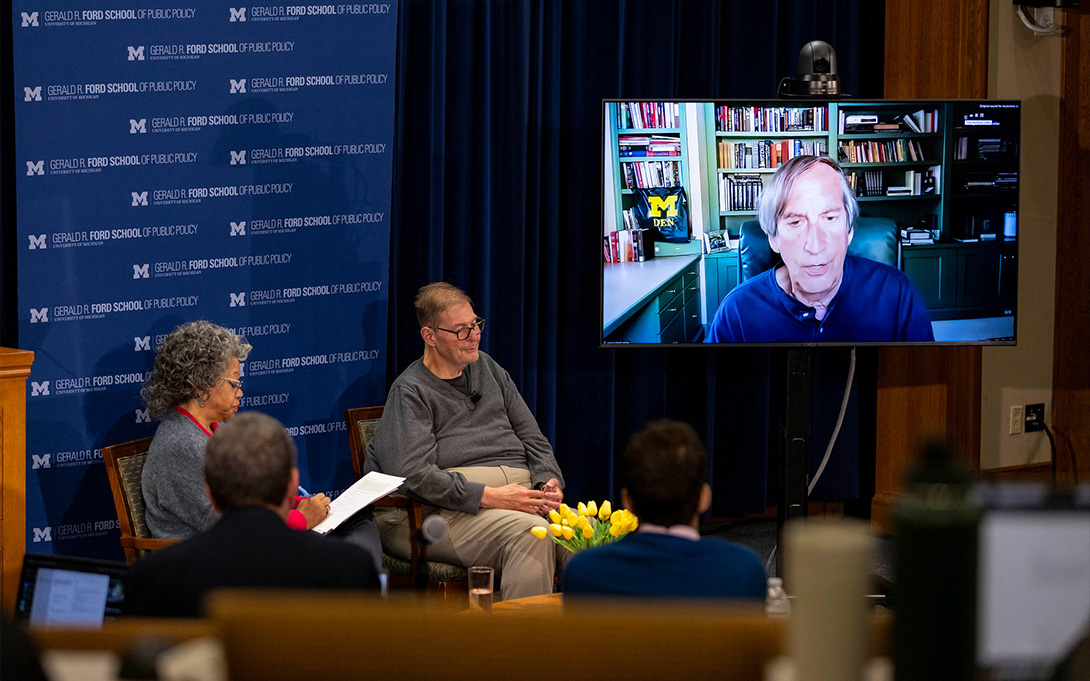
“Hamas has got the war they wanted.” That assessment came from Middle East scholar Hussein Ibish, who believes there has been a fundamental shift in the war between Israel and Hamas over the past year: from a more conventional airstrike campaign concentrated in Gaza, the conflict has evolved into an indefinite counterinsurgency effort against guerilla forces spread across the region. With Israel “stuck in a quagmire” of open-ended conflict, Hussein predicts that “it’s going to be hard to find politically viable inflection points in the coming months and years to pull out.”
Ibish joined diplomacy expert Aaron David Miller at the Ford School to reflect on the past year of war in the Middle East and discuss how the geopolitical situation may continue to develop. Miller blames the groups directly involved in the conflict and the international community alike for current conditions of horrific suffering and prolonged violence. He argued that both Israel and Hamas “have demonstrated little urgency, no capacity, and unbelievable disregard for human suffering on a scale that Israelis and Palestinians have not witnessed,” adding that “The international community–the vaunted international community–has once again revealed that it is too divided, it is too self-interested, it is too preoccupied, and it is too feckless to do much about it.”
Both Ibish and Miller agree that the United States’ role in the conflict has been complex. Whereas Israel explicitly uses starvation as a weapon of war to punish the Palestinian people, Ibish claims that the United States has played more of a “Janus-faced role,” supplying munitions to Israel on the one hand while simultaneously providing aid to prevent full-blown starvation, famine, and epidemic from taking hold in Gaza. Nonetheless, Miller pointed out President Biden’s abject failure to hold Israel accountable with “sustained and serious pressure,” characterizing the administration as “reluctant to impose a single cost or consequence on policies of the the Netanyahu government.”
Ibish shed light on how the internal politics and opinions of the Palestinian people have shifted in response to the war. “Hamas is an asset to Israel” and does not represent the natural democratic leadership of Palestine, he said. Rather, Israel’s historic strategy in bolstering Hamas’ power has been to keep Palestinians internally divided in order to thwart their ambitions for independence and justify continued hostilities. But now that Hamas has chosen to sacrifice “their lives and their institutions, and the little statelet that they had built in Gaza in exchange for an open-ended war with Israel,” Palestinians’ “anger is bubbling under the surface.” He added that “There are lots of Palestinians in Gaza who've had time to reflect on Hamas leadership’s decision to sign 2.2 million people up for martyrdom without any consultation.”
Miller and Ibish did not feel confident making deterministic predictions about the future of the crisis in the Middle East, but both argued that opportunities to extinguish Israel’s wars against Hamas, Hezbollah, and Iran are only diminishing as violence escalates and multiplies. Nonetheless, Miller believes that history offers an important lesson about the limitations of external involvement by actors like the United States: “The last year has demonstrated with a frightening clarity one elemental fact, which all of us should have recognized from the beginning. And that is when combatants to any conflict [are] engaged in something they perceive to be vital, even existential, the influence of outside parties is highly restricted….The Middle East is literally littered with the remains of great powers who consistently and wrongly believe they can impose their will on small.”
More news from the Ford School